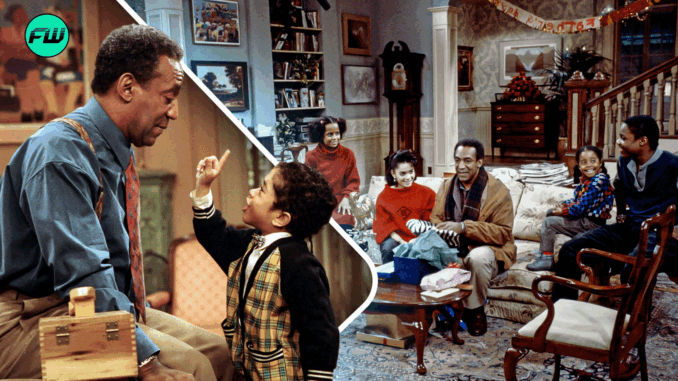
SUMMARY
- The Cosby Show broke barriers in the ’80s with iconic characters and game-changing Black family representation.
- As ratings slipped in season 8 the creators chose to end it before it lost the magic that made it a cultural force.
- Allegations against Cosby led to reruns being pulled and a legacy once cherished now marked by deep controversy.
When The Bill Cosby Show aired in the ’80s, it wasn’t just another sitcom, it was a cultural movement. Bill Cosby, famed for his sweater-wearing, dad-joke glory, became the face of wholesome TV. For eight seasons, the Huxtables brought laughs, life lessons, and landmark representation to millions of households.
But behind the scenes and years later, the story took a darker, more complicated turn. From soaring ratings to sudden rerun removals, the once-beloved show’s legacy is now tangled in controversy. So, why did The Cosby Show end, and how did it go from TV royalty to virtually erased? Let’s break it down.
Why did The Bill Cosby Show get cancelled?
Let’s rewind to the ’80s. Before the iconic Huxtables ever entered our living rooms, Bill Cosby starred in The Bill Cosby Show, a different series that aired from 1969 to 1971 on NBC. It was a modest success but short-lived, focusing on Cosby as a high school gym teacher. Fast forward to 1984, and The Cosby Show debuted with the same legendary comedian, but this time with a fresh format, a new network vibe, and a groundbreaking mission.
Gone were the classroom halls, and in came the brownstone charm of the Huxtable household. Cliff, Clair, and their five kids weren’t just sitcom characters, they were cultural icons. An upper-middle-class Black family front and center on primetime TV? That wasn’t just entertainment; it was representation. It remained the number one-rated show on television for five consecutive seasons, and the only show (alongside All in the Family) in the history of Nielsen ratings to do so. It gave Thursday nights a whole new meaning.
But like all great shows, the momentum started to slow. By its eighth season, The Cosby Show was no longer the TV juggernaut it once was. The writing was still solid, but audiences were shifting. New shows (The Simpsons, anyone?) were taking over, and the once-unshakable Thursday night slot began to wobble. NBC and the showrunners weren’t blind to it. Rather than drag it out or risk diluting the legacy, they made the call to end things on their terms.
So no, the show wasn’t canceled in disgrace or pulled off the air overnight. It bowed out after eight groundbreaking seasons because the timing felt right. The Huxtables had told their story, made their impact, and left their mark. And while its legacy would later become complicated, at the time, it was simply the close of a cultural phenomenon that knew when to say goodbye.
How allegations tainted The Cosby Show’s legacy
For years, The Cosby Show was untouchable, an American TV treasure. It wasn’t just another sitcom; it was a blueprint for representation, a pop culture cornerstone, and a nostalgic comfort blanket for millions. But starting in the mid-2010s, all of that changed very fast.
As s*xual assault allegations against Bill Cosby surfaced and snowballed, the feel-good legacy of the show took a serious hit. Networks pulled reruns. Streaming platforms dropped it. Suddenly, that warm, familiar Huxtable household felt tainted. Fans were torn and rightfully so. How do you reconcile the powerful cultural impact of the show with the disturbing accusations against its star?
The conversation around The Cosby Show shifted from one of praise to one of discomfort. Some tried to separate the art from the artist, but it’s not that simple when the artist is the show. Bill Cosby wasn’t just the lead, he was the vision, the voice, the brand. What was once celebrated as a beacon of progress became a cautionary tale in the blink of an eye.
What happened to Bill Cosby, and where is he now?
Bill Cosby’s fall from grace was swift and jaw-dropping. Once known as “America’s Dad,” Cosby was accused by more than 60 women of s*xual assault and misconduct, with claims dating back as far as the 1960s. In 2018, he was convicted of drugging and assaulting Andrea Constand, earning a 3 to 10-year prison sentence. He became one of the first major celebrities to be imprisoned during the #MeToo era.
But he didn’t serve the full sentence. In 2021, the Pennsylvania Supreme Court overturned his conviction, citing a prior non-prosecution agreement. Just like that, Cosby walked free after nearly three years behind bars.
His legal troubles didn’t end there, though. In 2022, a civil jury found him liable for s*xually assaulting Judy Huth in the ‘70s, awarding her $500,000 in damages.
Now 80-something and living quietly in Pennsylvania, Cosby claims innocence, but the court of public opinion? Not so forgiving. His legacy is fractured, his accolades stripped, and reruns of The Cosby Show largely erased from airwaves. The man who once helped define American television now symbolizes how fast legacies can unravel.
